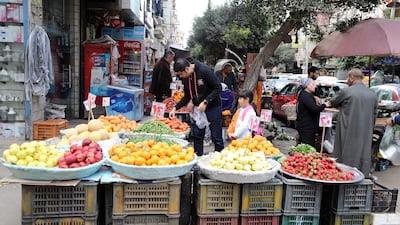Egypt's annual urban inflation eased to 25.7 per cent in July from 27.5 per cent in June, according to the country's statistics agency Capmas.
On Thursday, it said month-on-month prices fell by 0.4 per cent, down from 1.6 per cent in June. Food prices eased by 0.3 per cent in July but remained 28.5 per cent higher than a year ago.
Prime Minister Mostafa Madbouly said that Egypt aims to reduce inflation to below 10 per cent by the end of 2025 or the beginning of 2026.
He also sought to calm nerves about how Egypt was affected during Monday's global markets' plunge, saying the 'hot money' that investors withdrew represented no more than 7-8 per cent of their T-bills holdings.
Mr Madbouly said the money that left Egypt during Monday's sell-off did so at a high price to investors because Egypt let its exchange rate move freely.
Foreign investors sold Egyptian pound treasury bills and converted the proceeds to US dollars as part of a broader shift into safer assets, according to analysts and bankers cited by Reuters. The sell-off was compounded by regional political tensions and concerns about government finances, they said.

Egypt's economy has faced several challenges in recent years, including high debt levels, inflation and foreign exchange shortages.
The fallout from the wars in Ukraine and Gaza as well as the Covid-19 pandemic have only added to its woes.
Egypt has been introducing aspects of an International Monetary Fund-backed economic reform programme since 2022, which saw it devalue its currency four times and cut food and energy subsidies, although some remain in place.
The IMF deal was announced as part of a rescue package worth more than $50 billion that economists say may have saved Egypt from an economic meltdown. With a foreign debt of more than $160 billion, the package allowed Cairo to service its debt after more than two years of a foreign currency shortage.
This week, a policy brief, published by the Peterson Institute for International Economics in Washington, cast doubt on Egypt's ability to introduce the reforms necessary for it to change course on decades of economic struggles.
“Of course, the transition won’t be easy. Inflationary pressures, especially on food prices, are a significant concern,” the brief said.
“But with targeted social safety nets, the government can protect the most vulnerable while allowing the economy to breathe.”


